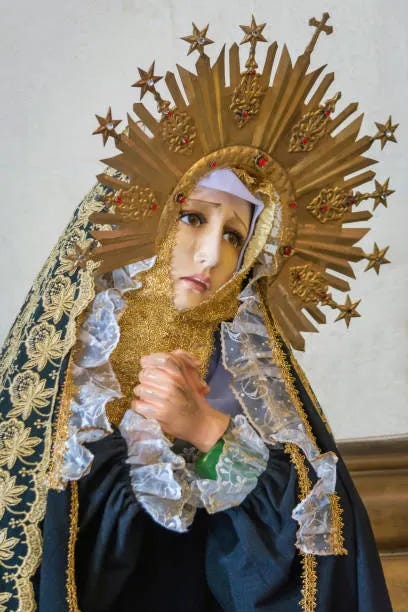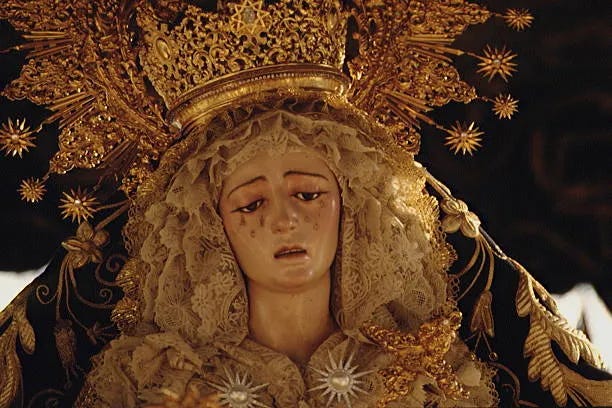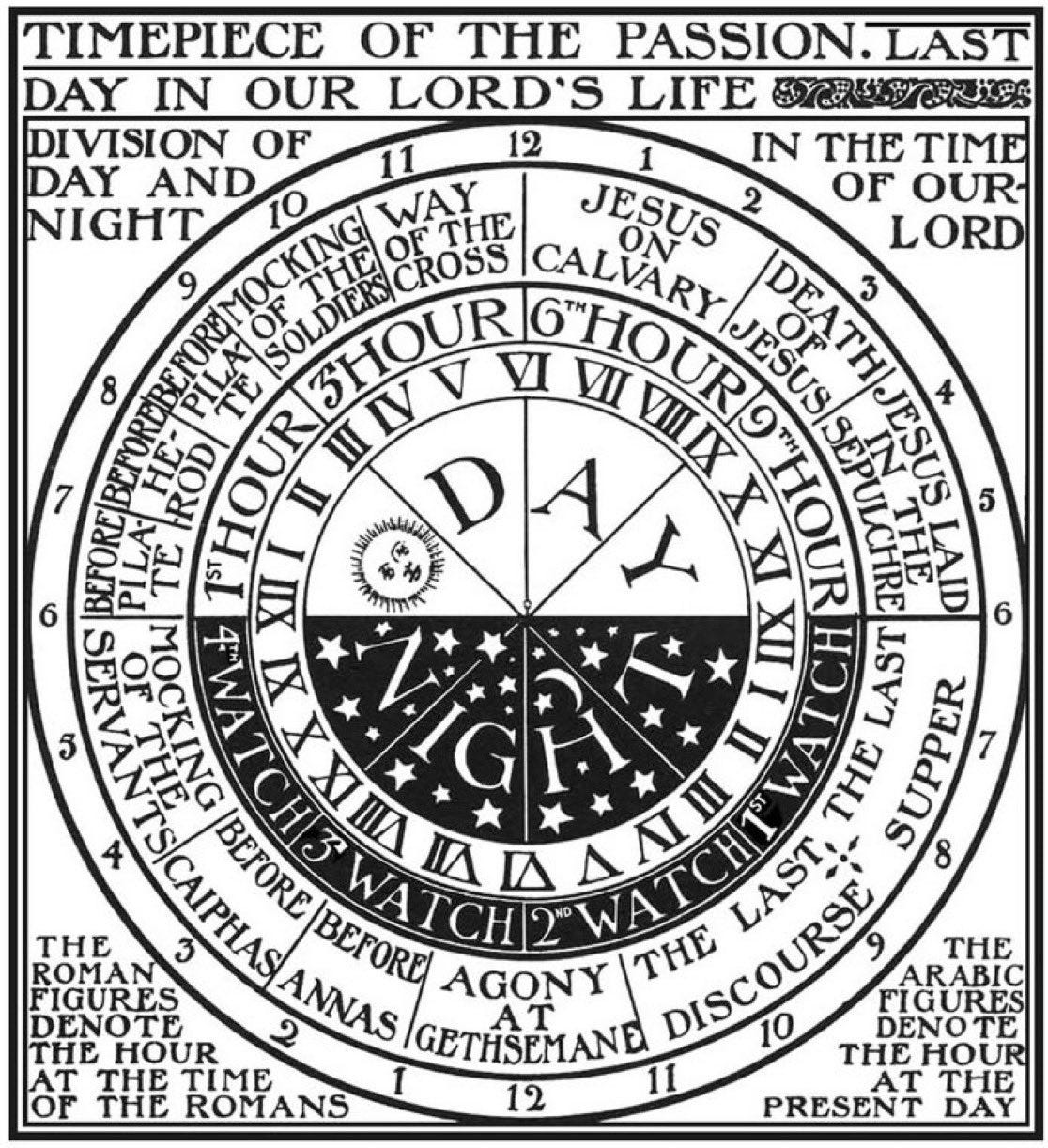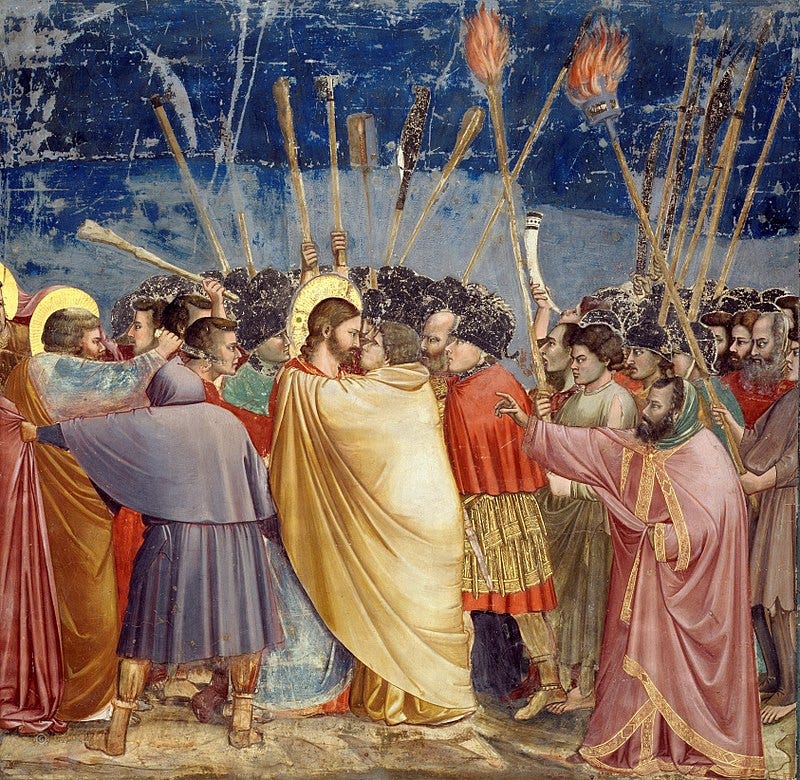We continue our 9 day Novena to Our Lady of Sorrows which commenced on the Feast of Our Lady of Sorrows and will conclude on Holy Saturday. We are praying for the following intentions:
The repose of the soul of the recently deceased, Fr. Paul Mangiafico
reparation for all blasphemies against Our Lord in the Blessed Sacrament
reparation for all blasphemies against the Blessed Virgin Mary
The Feast of the Seven Sorrows in September is devoted to all of her Seven Sorrows; the feast today focuses more specifically the last four of those -- i.e., on what she suffered during Passiontide. In other words, the feeling of the day is akin to what one feels when looking at Michelangelo's Pieta: we imagine Our Lady watching her Son enduring His betrayal, His arrest, His torture, His crucifixion, His death, and His burial.1
Most Blessed and afflicted Virgin, Queen of Martyrs, who didst stand generously beneath the cross, beholding the agony of thy dying Son; by the sword of sorrow which then pierced thy soul, by the sufferings of thy sorrowful life, by the unutterable joy which now more than repays thee for them; look down with a mother’s pity and tenderness, as I kneel before thee to compassionate thy sorrows, and to lay my petition with childlike confidence in thy wounded heart. I beg of thee, O my Mother, to plead continually for me with thy Son, since He can refuse thee nothing, and through the merits of His most sacred Passion and Death, together with thy own sufferings at the foot of the cross, so to touch His Sacred Heart, that I may obtain my request,
Here pause and name the favours which you are asking Our Sorrowful Mother to obtain for you through this Novena. (Let your secondary intention be to pray for the intentions of all the people making this Novena})
For to whom shall I fly in my wants and miseries, if not to thee, O Mother of mercy, who, having so deeply drunk the chalice of thy Son, canst most pity us poor exiles, still doomed to sigh in this vale of tears? Offer to Jesus but one drop of His Precious Blood, but one pang of His adorable Heart; remind Him that thou art our life, our sweetness, and our hope, and thou wilt obtain what I ask, through Jesus Christ our Lord. Amen.
Hail Mary, Virgin Most Sorrowful, pray for us (seven times)
This day, Maundy Thursday (also "Holy Thursday" or "Shire Thursday"1) commemorates Christ's Last Supper, the initiation of the Eucharist, the institution of the priesthood, and our Lord's Agony in the Garden of Gethsemani on the Mount of Olives. Its name of "Maundy" comes from the Latin word mandatum, meaning "command." This stems from Christ's words in John 13:34, "A new commandment I give unto you." It is the first of the three days known as the "Triduum," and after the Vigil tonight, and until the Vigil of Easter, a more profoundly somber attitude prevails (most especially during the hours between Noon and 3:00 PM on Good Friday).
The Last Supper took place in "the upper room" of the house believed to have been owned by John Mark and his mother, Mary (Acts 12:12). This room, also the site of the Pentecost, is known as the "Coenaculum" or the "Cenacle" and is referred to as "Holy and glorious Sion, mother of all churches" in St. James' Liturgy. At the site of this place -- our first Christian church -- a basilica was built in the 4th century. It was destroyed by Muslims and later re-built by the Crusaders.2
Holy Thursday
Morning Meditation
"IN REMEMBRANCE OF ME."
Do this in commemoration of me. (Luke xxii. 19). St. Thomas says that the Redeemer left us the Most Blessed Sacrament that we may ever remember the blessings He has obtained for us, and the love He showed us in dying for us. And hence the Blessed Eucharist is called by the same holy Doctor Passionis Memoriale, a memorial of the Passion.
I.
It is the opinion of sound Theologians that by these words, Do this in commemoration of me, priests are bound when celebrating to call to mind the Passion and Death of Jesus Christ. And the Apostle would seem to require the same of all who communicate. As often as ye shall eat this bread and drink this cup, ye shall show forth the Lord's death. (1 Cor. xi. 26). St. Thomas writes that it was for this very end the Redeemer left us the Most Holy Sacrament, namely, that we might ever remember the blessings He has obtained for us and the love He has shown in dying for us. And hence the same holy Doctor calls the Blessed Eucharist a Memorial of the Passion, Passionis Memoriale…
Consider therefore that in the Sacrifice of the Mass it is the same Holy Victim Who gave His Blood and His Life for you. And the Holy Mass is not only the Memorial of the Sacrifice of the Cross; it is the same Sacrifice; for He Who offers it, and the Victim offered, are the same, namely, the Incarnate Word. The manner alone is different. The one was a Sacrifice of Blood; this is unbloody: in the one Jesus Christ really died, in the other He dies mystically. "One and the same Victim," says the holy Council of Trent, "only the manner of offering is different." Imagine, therefore, when you are at Mass that you are on Calvary and offering to God the Blood and Death of His Son. And when you communicate, imagine that you are drawing His Precious Blood from the Wounds of your Saviour.
O Lord, I am unworthy to appear before Thee, but encouraged by Thy goodness I come this morning to offer unto Thee Thy Son. Ecce Agnus Dei! Behold the Lamb here Which Thou didst behold one day sacrificed for Thy glory and for our salvation upon the Altar of the Cross! For the love of this Victim so dear to Thee, apply His merits to my soul and pardon all the offences great and small that I have committed against Thee. I grieve with my whole heart for having offended Thy Infinite Goodness.
And Thou, my Jesus, come and wash away in Thy Blood all my stains ere I receive Thee this morning. Domine, non sum dignus ut intres sub tectum meum, sed tantum dic verbo, et sanabitur anima mea! I am not worthy to receive Thee, but Thou, O heavenly Physician, art able with one word to heal all my wounds. Come and heal me.
II.
Consider, moreover, that in every Mass the work of Redemption is renewed: so much so that if Jesus Christ had not died once upon the Cross, the celebration of one Mass could procure for the world the very same blessings we have received through the Death of our Redeemer. Tantum, valet celebratio missae quantum mors Christi in cruce. The celebration of the Mass is of as much value as the Death of Christ on the Cross (St. John Chrysostom). Therefore all the merits of the Passion are applied to men by means of the Sacrifice of the Altar.
According to the Council of Trent the time of the celebration of Holy Mass is precisely, then, that time in which the Lord is on His throne of grace to which we are exhorted to have recourse that we may obtain the Divine mercy and find grace in seasonable aid. (Heb. iv. 16). St. John Chrysostom says that the Angels wait for the time of Mass to intercede with greater efficacy in our favour, and he adds that what is not obtained at Mass is with difficulty obtained at any other time.
O miserable being that I am! How many graces have I lost, O my God, from having neglected to ask Thee for them during Mass! But since Thou now givest me new light I will no longer be negligent. I unite, then, O Eternal Father, my prayers with those of Jesus Christ. I hope for all through Thy merits, O my Jesus, and through thy intercession, O my Mother Mary.3
https://fisheaters.com/customslent10.html
https://fisheaters.com/customslent13.html
https://www.religiousbookshelf.com/meditations-and-readings/day/2154-Holy-Thursday.html











